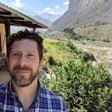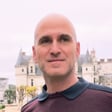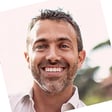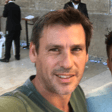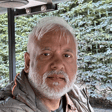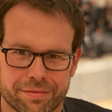Become a Creator today!Start creating today - Share your story with the world!
Start for free
00:00:00
00:00:01

Ganesh Ramakrishnan
We talk about riding the dot com boom/bust to taking a job at big Pharma to becoming a headhunter to working for the Gates foundation to becoming a film maker to running an incubator.
Recommended
Transcript
Ganesh's Unconventional Background at INSEAD
00:00:01
joewaltman
All right, today we've got Ganesh Ramakrishnan. Ganesh, thanks so much for joining.
00:00:05
Ganesh
It's my pleasure. It's good to be here finally.
00:00:08
joewaltman
i So, first
Educational Challenges and Caste Discrimination
00:00:11
joewaltman
question or two-parter. First, refresh your memory. What were you doing before NCM? And what have you been up to for the last 20-ish years?
00:00:19
Ganesh
Well, I mean,
Choosing INSEAD Over Harvard
00:00:21
Ganesh
INSEAD was so long ago. um And I think when I go back to the beginning of my career, it's even further back. So my memory may be a little bit shaky. But I think when I came to INSEAD, I was both one of the older students there. And I think maybe one of the more unconventional students. I don't think I was older by March. I want to say I was like 28 or 29, but I
Anthropology Studies and Caste Bias in India
00:00:41
Ganesh
still think it was a little bit older. And I do remember that when I chose NCI, that was a huge factor in why I decided to go there instead of HBS, um because I really appreciated the fact that the average student body was a little bit older. And I think it was on two counts. One is, I think, um socially, I think it was a better fit for me.
Career Beginnings at a Hedge Fund
00:01:01
Ganesh
um There's a big difference between being 23, 24 and being
00:01:04
Ganesh
27, 28. And also more importantly, I think professionally, I really appreciated that. I think when you've just got a couple of years of experience post school, which I think a lot of students in the US programs tend to do, you're just at the beginning of your career. And I think by the time you get to your 20s, late 20s,
00:01:19
joewaltman
All
Early Internet Ventures and Connection to Amazon
00:01:21
Ganesh
mid 20s, you're typically in a middle management, if not
00:01:24
Ganesh
something more than that. And I think that is both a good learning experience in general, but also a pretty humbling experience. And I think that, you know, overall, and I found that reflected in the student body at NCI. So for me, it was a good choice. ah But going back to what I did before, I said I had a slightly unusual background.
00:01:37
joewaltman
right.
00:01:40
Ganesh
I studied
Co-founding Gobi During the Dot-com Boom
00:01:41
Ganesh
anthropology in college. I came to a school at the in the US from India, um mostly because I kind of wanted to study something like anthropology or sociology. And if you are a proficient student in India, you really don't get too many options. You kind of are forced into either being an engineer or a doctor. It was so bad, actually, I come from a part of the country where there's so much cost-based discrimination that I couldn't even, I was the national top but I couldn't even get into a local college because of my caste affiliation. So in a way I was kind of like forced out of the country.
00:02:14
Ganesh
ah but it it
00:02:15
joewaltman
I'm not saying that you said national topper.
00:02:18
Ganesh
Yeah.
00:02:19
joewaltman
i
00:02:19
Ganesh
so india has
Gobi's Financial Struggles and Ganesh's Exit
00:02:21
Ganesh
it's It's a bit like the A levels, right? Everybody in the country, there are a couple of different national ah boards, right? Scholastic boards, if you will. Think of it as the equivalent Indian equivalent of the s SAT t and the ACT, except it's not a not a one-off exam. It basically sets the curriculum for everything you
Joining Eli Lilly Amid a Tough Job Market
00:02:41
Ganesh
study from grade 1 through grade 12 and then you get tested and everybody in the country tends to write this exam. And India being India, not only do you have to ah participate and score in the exam but they actually add up your points and they say the person who scored the most is the topper and then the second and it goes all the way to India.
00:03:00
joewaltman
Oh, nice.
Transition to Executive Search
00:03:01
Ganesh
I mean, millions of people writing this exam. So it's fractions of points and luck that make the difference.
00:03:06
joewaltman
Yeah.
00:03:07
Ganesh
right So actually, it is a pretty cool thing.
00:03:07
joewaltman
Yeah. That is.
00:03:09
Ganesh
But I got into a college there. so um So I think that was just like my favorite. It was fine, because I think I would have been bored. I really just did not want to study engineering or medicine, not because I didn't
Leading HIV Program at the Gates Foundation
00:03:21
Ganesh
find them interesting. But I just hated the mentality that said, look, this is the only thing you can do if you're actually ah smart. And I just thought, like that's just bullshit. you know, I mean, I just never bought into that mindset. and I think I've been a pretty, I guess, um diligent, you
Film Work and LGBT Issues in "Firebird"
00:03:41
Ganesh
know, sort of like non-problematic student.
00:03:44
Ganesh
I think you have to be when you're that focused. So this was my rebellion in a way.
00:03:47
joewaltman
Okay, let's move on from the academic stuff. What were you actually doing professionally but between before it's yet?
00:03:51
Ganesh
So I Yeah, so I actually started working at a hedge fund. That was my first job at DHR New York. And it was a great place to be,
Venture Fund Focused on Climate Solutions
00:04:01
Ganesh
um both because they were just you know so unusual in what they did, their approach to everything. It was just quantitatively driven. And because they gave you so much freedom to do anything that you actually thought was interesting. So somehow I ended up, I started off actually doing some derivatives trading, but then very quickly and then some fixed income trading. And then very quickly
The Journey's Ups and Downs
00:04:21
Ganesh
ended up spending a lot of my time working on a few initiatives that ah they were exploring, because this was the early days of the Internet. I mean, you don't even have the Internet. You just, you know, mosaic was still becoming Netscape and that kind of thing. And um there were three initiatives that the ah D-Shaw was focused on. One was a company called Juno, which is the first
00:04:41
Ganesh
free email service, online email service. The other was Farsight, which was a ah private trading platform. So before there was things there were things like E-Trade and such, ah there was Farsight. And actually, Farsight was bought and has become one of the bigger platforms now. And the third was a little company called Amazon. So Jeff Bezos was, as you know, one of the VPs over there. And so yeah, so it was working on the early days, the strategy for all of these things. And it was a really tough intoxicating time to be there. And so I did that for a few years and as somewhat inevitable being in that place and in that time, a couple of colleagues and I came up with an idea for a startup. So some years after that, and I want to say at this point, we are
00:05:26
Ganesh
in the late 90s or 98 or so. um and i'd been a dho for a few years at that point We broke off to start this company of our own. and It was called Gobi. It was really a fantastic time. you know You're young. You're raising money. It was a great time to raise money. It was a great time to get people to work with you. And the kinds of people that you know I got to work with at that age was pretty amazing. like Our board had the CEO of Merrill Lynch of US Airways. Jack Welch was an observer on our board.
00:06:01
Ganesh
um a sea of non-star capital. We had some really amazing people to learn from. And I think for me, more than just having these people, what was fascinating at that time is that everybody, all of these big CEOs were trying to figure out what is this internet thing and what is it going to mean for how people work with it and how is it going to change the way we conduct commerce. So they would spend an average of, I would say, two to three hours a week um on our business. And that was incredible learning. I mean, i don't get I haven't gotten that kind of time a month from my bosses in subsequent careers.
00:06:35
joewaltman
Mm hmm, mm hmm.
00:06:36
Ganesh
So yes, that's what I was doing and steered it through both a heady time and then a very difficult time when 9-11 happened and the markets crashed. um it was ah you know The flip side of everything good was there. you know One day I'm on you know on the pages of Forbes and able to you know make a call to anybody I want and raise money. And the next day, like you know your company's falling apart around you. And the hardest thing is...
00:06:58
joewaltman
but well What did this company do? I didn't catch it.
00:07:02
Ganesh
Okay, so um that's a good question, right? So what the company did was what we were trying to do was to just monetize, um you know, what we'll call digital eyeballs at that point. And I think to some extent, we still are. And the idea was just really the value of every single eyeball or every single customer was some combination of your proximity to them, how close um Are you to the customer and what is the breath of your interactions with them so if you think about it furthest apart up in those days what companies like amazon because you could buy a book from there but you could also go buy from bonzo nobles dot com little bit closer were the portals like yahoo that could sort of like ah not only
00:07:42
Ganesh
um you know direct you to buy it from one vendor versus the other, but also gave you news and email and therefore you had a little bit more traction. You'd always start in Yahoo. Closer were the ISPs and because they had a much greater breadth and you know they could direct your journey from the beginning. But the most valuable real estate at that point was the desktop because everybody, that's how you got on the internet. So if you could get someone the minute you got on, then you had it all. But at that point, the PC market was incredibly fragmented and it was a buy to use market, so they had no lean on the customer.
00:08:14
Ganesh
And the only operating system at that point, Apple was kind of like almost dead, right, it was Microsoft.
00:08:19
joewaltman
Yeah.
00:08:19
Ganesh
And Microsoft was in the midst of their massive antitrust litigation. So the last thing they were going to do And they had the ability to do this was to go and say, we're even closer to the customer. So that's where we came in. The business was basically, you know, you amortize the cost of purchase of a computer and the Internet. I mean, we saw these as commodities. We're like, look, we'll just write it off. We did charge a subscription. So it wasn't like a cost out of the company. But because we did that, we were able to bring many, many more people online and sort of have them bypass the fifteen hundred that you would pay typically to go online. So the idea was, OK, can we make this a mass medium?
00:08:56
joewaltman
So you're giving free internet or you're also giving free computers in exchange.
00:08:56
Ganesh
product.
00:08:59
Ganesh
we're getting three computers free.
00:09:00
joewaltman
for
00:09:01
Ganesh
now it's not It wasn't free because there was it was a subscription model. it wasn't That's the one of the only reasons perhaps that we survived when almost every other startup in that period collapsed because we have we did ensure that like there was a fundamental, but it was at cost. So we just amortized it. So you pay $24 a month and you'd get a computer and dial up. And those days AOL was charging $24.99 just for the internet. right So it was really in a way like the precursor of a lot of what we did. and the If you look at the Google search bar, that's something that they took with us. They were one of our early partners in in those days. And the idea was, Gobi, when you booted it up, you just had that bar. So so it was for a lay customer, not someone who's a technophile. But you could just type in whatever you want. And it was the idea was that it was moot, whether it was a resident on your PC or somewhere else on the broad internet. you know We were far from cloud and things then. But we knew something like that could happen.
00:09:57
Ganesh
So just the idea was to create that seamlessness. So yeah, so that's that's what the business was. And you know when the markets crashed, it got really, really difficult because we had a, not a flaw, but a challenge in our business because every customer we acquired, it was contingent on us being able to pay for that PC. right? At least upfront. And that's a massive capital expenditure. From the beginning, that was our biggest challenge. Because startups don't do well, ah you know, with large expenditures based on equity.
00:10:28
Ganesh
You need to sort of like, to get like a million customers, you need $500, $600 million dollars worth of cash, right? That's debt money.
00:10:35
joewaltman
Yeah.
00:10:36
Ganesh
And debt is not a good synonym with startups because you don't have the history. So a lot of our work was to try and figure out how to solve that problem. But once it the markets crashed, it became harder and harder to raise that kind of money to to keep going. So at that point, we had to sell um which is a very, very difficult time because, you know, it wasn't a flush market, but we did sell. And then, yeah, and then I exited. And then I was kind of like, I don't really know what I want to do or what I can do. When you've been the CEO of a startup and the founder, you've done everything from answer the front phones to, you know, sit in a boardroom with some pretty amazing people. So I think that's the point at which I wanted to take a little bit of time off. And I thought, well,
00:11:17
Ganesh
um I also want to think about what I've done because I've been, you know, you're just running, you're not sleeping, and it's so heady, but I just felt like I needed to sit and think, could reflect on what I've done good and bad before the moment just passed me by and I was swept away into something. And I thought, well, there isn't a better place that to do that than business school. So I think my motivation was something different. I think it was just find some time to just think for myself.
00:11:39
joewaltman
Yeah.
00:11:42
Ganesh
And that's how I kind of ended up at INSEAD. So that's why what I meant when I said like I had a pretty unconventional background. Because if you really ask me, I could answer that in a simple sentence.
00:11:48
joewaltman
Yeah. That's really interesting.
00:11:51
joewaltman
Yeah. Yeah. You were on that. You were on the front lines of the, uh, the dot.com boom and bust.
00:11:54
Ganesh
Yeah, exactly. And vast, yeah.
00:11:57
joewaltman
So what's been up to, what do you have for the last 20 years?
00:11:57
Ganesh
Yeah.
00:11:59
Ganesh
Well, ah you know, I'll tell you, the only thing that's consistent is that the lack of a conventional straightforward path has persisted. i I mean, I think when I graduated from INSEAD, it was a really, really hard time. It was the market was a mess. You know, if you remember, it was impossible to find jobs. And um You know, I was sort of like, in the end, trying to choose is between going into ah a VC job and going into something more conventional. And um one of my mentors from my startup said, look, you know, if you have to go into something that is doing that's in a challenged place, you know, because that's the only time you actually don't have anything you're doing ah is making a difference. Because if you go into an industry that's winning like tech or something like that, you'll just get swept along with the success and you won't know whether it's your work or not. So I was like, well, that's good advice.
00:12:46
Ganesh
So I ended up actually going to Eli Lilly, which is a big pharma company. Not because I was particularly interested in pharma or anything, but you know I thought, well, i mean pharma is an industry that was getting battered you know in the market, but Lilly was in a really unusual position of strength. They were launching seven drugs in three years, which um was at that point unprecedented in pharma. so I said, well, this is a good place, it's only for me to learn. And I kind of liked the Midwestern values that come out of like ah Wall Street, um you know, Quagmire and you, I listened to your podcast and you know exactly what that's like. And it was just exhausting. I mean, like, I think it had just like ripped my soul and heart out and like, you know, and I was kind of like a mess. So I thought, you know, let's go get some like Midwestern wholesomeness. And it was a great place for that. So I went to Lilly.
00:13:32
Ganesh
I was with them for a number of years. I started in marketing, and then I got pretty quickly rotated out. And then I moved to Singapore to head up um the ASEAN cluster of countries for them as a general manager. It was sort of like a path into other general management positions. But having done that for a few years, I kind of, they were already saying, oh, do you want to, where do you want to go next? Do you want to go to India? Do you want to go to like Japan or, you know, run which country cluster would you like to sort of like ah run? And I was like, I don't know that I actually want to do this. I love the place and I love what I was doing, but I didn't go into it because I wanted to do pharma. I went in there because I wanted to learn something and I wanted a certain aesthetic and a certain quality of life. um So I started to talk to a few friends about like, look, what else could I do? And one of them put me in touch with, um you know, a friend of his at a place called Hydric & Struggles, which is an executive search firm.
00:14:21
Ganesh
I said, go talk to Charlie. He's the regional head and he'll give you some good advice. you know So I was like, okay, this sounds great. And I went and talked to him. And in the course of the conversation, you know he's an amazing guy, ah one of my closest friends to date. He said, look, why don't you come work with us? And I think I must have spat my coffee out because that isn't what I was thinking about at all. But then when I thought about it, I was like, well, this is kind of interesting. It is Being an executive search consultant is very much like being a general manager. It is about saying, what is the business problem over here and what is this human skill set that is best placed to solve this? It's just over a much wider network and across a much broader breadth than you you have access to in a particular company. I said, well,
00:15:00
Ganesh
if that' If meeting some interesting people and finding out about some interesting things is the worst thing that can happen at a moment when I'm questioning what it is I actually want to do and what I'm good at, it actually sounds like a pretty good match. So I moved to Hydric. I was supposed to work with them in Singapore in that ah region, but then they asked me to move to India to head up a life sciences strategy for them because they were struggling there. I went there for about a year, and then they said, look, can you move to Boston to head up our global biotech practice? right so And I didn't really want to, but my wife really wanted to. We had a young kid. She's from New England. She's like, I want them to have a New England upbringing. We've been in Asia for so long. you know Let's sort of like give it to a change. So I was like, OK, fine. you know I like Boston too. I went to school there.
00:15:45
Ganesh
um So we moved there, but it, and I was there for a few years, but it was depressing. Depressing because I went there in 2008, nine when everything was, you know, that was a big collapse. So rather than actually do what it is I thought I was getting to do, which is really to help people place them in interesting jobs, ah help them steer and, you know, ah manage complex careers, you know, at ah at a very senior level and all I was doing is actually helping CEOs sort of like figure out you know, attrition plans and like, you know, reductions in force because that was was happening. So it was really, I mean, it was interesting work, but it was depressing. It was emotionally draining. And like, I think coming out of my startup, I sort of like exhausted all of that. So I started once again a few years in thinking about what is what it is I wanted to do. And um then my my wife and I had this idea for a startup that we wanted to do. And
00:16:40
Ganesh
We thought, well, let's move to India and and do this. um And so we made that decision. And um i was you know we were all set to go. We had everything sorted out. We had the kids in school, et cetera. And then I called a few friends who were in India and said, hey, I'm moving back to India. you know Hopefully we can meet up and stuff. And one of them, who was a classmate of mine from from Harvard, ah said, well, who worked at the Gates Foundation said, like would you come work with us? And I said, well, I'm not really looking for a job.
00:17:07
joewaltman
Okay.
00:17:10
Ganesh
ah And I'm ah also not a public health person, and I'm not really qualified. ah But she said, well, just have a conversation. I said, again, yeah, you know I'm not doing anything for the next several weeks. I'm happy to have a conversation with people and you know we get to know more people. um So I did. And it was with the HIV program, and they wanted me to run a program called Avahan, which is was the Gates Foundation's largest field program. It is HIV prevention in India and and in Africa. And the more I looked at it and the more I got to know, the more I thought, wow, you know, actually I understand why they want me to do it, do with this. um And I am qualified for this particular, it was the focus was to transfer the program from
00:17:50
Ganesh
the Gates Foundation to the government. And having grown up in the government, my dad was in the Indian indian ah Civil Services, um I had that background. I was like, okay, I can actually do this job. And then I thought, well, you know, I'll never get an opportunity like this, because I'm supremely unqualified for this. And I can probably start up a company any time in my life. But this is a once in a lifetime opportunity and it just felt so mission focused and it was just seemed like such a wonderful place to work and so I went there and I spent many years at the foundation first running this massive program in India and
00:18:25
Ganesh
across a number of countries in Western and Southern and Eastern Africa.
00:18:30
joewaltman
Thank you.
00:18:30
Ganesh
um And then um they had me moved to Seattle, which is how I ended up here, ah to run the advocacy policy and communications group for a number of the issue areas globally. um And that was a really, really fascinating job. it It was across health and development. And I did that for a ah number of years. um And it was a really, I think, fantastic part of my life. Yeah.
00:18:57
joewaltman
Can I ask it a question with for somewhat selfish reasons? um As somebody who spent you know most of your career working for, let's call it, um for-profit ah companies and then went and joined a nonprofit, kind of what's what's your opinion of just the the nonprofit space broadly and there you know how much good they actually create, blah, blah, blah?
00:19:25
Ganesh
It's, it you know, Joe, we should do another segment on that because I have a lot of thoughts. um
00:19:32
joewaltman
um but ah My answer is my my brief exposure with nonprofits um solidified my faith in capitalism and how everything should be done through a for-profit.
00:19:38
Ganesh
yeah mean to To a large extent, it it for me, I would say it did both that, but it also completely destroyed my faith in capitalism, because it sort of exposed to me that there was such disingenuity with which people made money. i mean like you know And I would say the first people to say that would be Bill and Melinda. That was the premise of the foundation. They're like, how the hell did we end up with so much money? and like you know And entire countries don't have that. It has nothing to do with capacity. So what is the structure? And we justify a lot of things in the name of capitalism. But capitalism we should remember is just set up to work for people with capital. And the fundamental assumption is that everybody starts from an equal place and that's not true. And I think it's a very dangerous narrative where individuals who have found success in that are held up um as
00:20:28
Ganesh
examples of what you can be, but they're exemplars. They're not examples. And I think that is the fundamental disconnect. So I have a lot of complex feelings. I think there's both a lot of good and there's a lot of bad. I think on the whole, the reason why I left is a little bit similar to what you said. it You know, working in this space makes you very cynical um at the end of the day, not because good work is not being done, but because how how difficult it is to actually do good work. And I think there is some element of hubris in a few people, whether it's in a private foundation or the government making these large decisions and judgment calls on behalf of many.
00:21:07
Ganesh
you know um And it's something that you know I struggle with. And a lot of people at the foundation, including Bill and Melinda Gates, struggled with. There was a saying that the Gates Foundation can you know sneezes and the world catches a cold. And you know you feel that very much in a place like advocacy, you know where you go around and say, look, you should pay attention to this. But who has the right to say what matters, right? it's It's very complex. You can just bug out and say, i and I don't care about anything, but then is that the solution either? So it is a complex question. um But yeah, it made made this some encounter and that's why I left.
00:21:38
joewaltman
Thank you, thank you.
00:21:40
Ganesh
Yeah.
00:21:41
joewaltman
All right, so but let's let's let's get back to to to your your journey. you You're you' now just left to get the Gates Foundation. and then but
00:21:49
Ganesh
Well, I love the Gates Foundation. um I didn't quite leave because you it's very hard to. I continue to work with them um as a consultant on a number of things. But the real reason I actually left is because I've been working on a film for a few years. And that started while I was in India.
00:22:02
joewaltman
oh
00:22:03
Ganesh
And um you know at that point in India, being gay was um a criminal offense. right And it was impossible to actually solve the problem of HIV if basic things like being gay is actually criminalized. So there was, you know, I was leading a pretty massive effort to sort of like help, you know, ah change that. ah And the goal was to sort of create a modern family glee moment in India, sort of like take this narrative to the public, because you will not actually have parliamentary movement unless they feel this public support for it, you know, and there was, but it had to be like surfaced a little bit more. um India solved its own problem through a completely this unconnected thing. It had to do more with privacy than with um you know gay rights, ah but that was a happy accident. But then at the same time, there was all of this problem in Chechnya where there was a massive crackdown on gay populations. And one of my closest friends from college was a filmmaker and I was chatting with him in London and he said, let's do something. He's you know he's Estonian.
00:23:07
Ganesh
So he said, let's take this whole idea of like storytelling you know and tell a story. And that's where the idea for this film came to sort of like take you know create a story. It was for Russia. It was to sort of like show the Russian audiences that like this is not what Putin is saying it is. It's not a Western disease. It is not a non-Soviet. um you know characteristic.
00:23:27
joewaltman
Hmm.
00:23:28
Ganesh
And the film is about two pilots in the Soviet Air Force, right at the peak of Soviet power, and the Afghan war time, who actually fall in love. And then they have this impossible Sophie's Choice decision of like, do we stay together? Do we have a life or, you know, the KGB is following them. So you're choosing death one way or the other, you know, which is the death that's more honorable is sort of like the question. So the movies out there, if anyone wants to watch it Sun Prime, it's called Firebird. And I, yeah, it smells exactly like it sounds.
00:23:56
joewaltman
but Firebird, spelled like it sounds.
00:24:00
Ganesh
And I wasn't getting to spend, i I was, you know, working on the script with my friend and with, you know, general stuff. wasn't it really getting to spend any time on it. So I thought, well, you know, this is I need to do what it is I really care about in life. ah So part of the goal was to do that. And it was really easy to find a so working solution with the foundation, um you know, to continue to work with them, but with a little bit more flexibility. And then COVID hit. And so that became its own spiral, because I got sucked into a lot of the work that ah that both the European and the US governments were doing with
00:24:36
Ganesh
trying to figure out how to finance a COVID vaccine, which is a very complex enterprise. And a lot of the work that I've been doing at the foundation um was around innovative finance and how do you create alternative financing structures and manage risk and things of that nature. So I got pretty involved with all of that for a bit. And i so I did that. And then the last couple of years, really, I've actually done something completely different. I'm now a an operating partner with a venture fund. um But I would say, honestly, more, I feel like I'm an executive with one of their startups and we are sort of playing in
00:25:15
Ganesh
I can't really obviously say much, but you know it it has to do with trying to find a solution for a climate-friendly world. you know We've got an entire generation, my kids, your kids, will grow up in at at a time when you know they have to have climate-friendly life choices. But that's an aspiration. That's a mandate, but there are no solutions. So the idea is to sort of say, look, can you make living um you know, as energy neutral as but as, for example, transportation has started to become. It's a very complex enterprise.
00:25:44
joewaltman
Hm.
00:25:45
Ganesh
So that is what we are trying to do. And at the same time address a lot of the problems that modern living has, you know, imposed on new generations, loneliness, this disconnection, you know, where technology intervenes so much that human contact is optional. um How do you sort of like flip the script a little bit on that? So it's very interesting work. um I don't know yet whether to be successful or not. I mean, it's a great challenge, but I think the nature of great challenges is that they can just be, you know, it's almost binary in some way. I suppose you you think about the outcomes, but
00:26:21
joewaltman
It's super interesting. Where are you in the process of this? Have you raised a fund or have you started to deploy some of the capital?
00:26:26
Ganesh
Yeah. so yeah so So far we have, I mean, I say we work with a venture fund and this is a startup, but technically we are more of an incubator.
00:26:27
joewaltman
you
00:26:34
Ganesh
So most of our funding has been um our own.
00:26:34
joewaltman
okay
00:26:38
Ganesh
We've done a seed round and even the seed was quite large. It was a 25 million seed round. um So most of our funding, which has actually been pretty substantial, has come through our own um you know ah funding pool, and then we've raised this a strategic seed round. That's a safe round, really. um And at some point, we'll decide if we want to do a series A. I mean, the goal is to delay that as much as we can, you know just because of how expensive equity is. And I think
00:27:11
Ganesh
um We're hoping to have a prototype of all of this by the end of the year. And I think that will be a good moment for us to actually go out and raise and able much better terms.
00:27:22
joewaltman
Yeah, very very cool. Very cool.
00:27:25
Ganesh
Otherwise, it's it's a very hand wavy, you know, I think it used to have, you know, some traditional, if you will, right?
00:27:27
joewaltman
Yeah.
00:27:31
joewaltman
It sounds sounds very...
00:27:34
Ganesh
Yeah.
00:27:34
joewaltman
and it it might um that This is probably a good segue for for the the the last question or the last two questions. um i Is there anything that we as the community can do to help you, you know either professionally or personally and vice versa? ah what What might you be able to do to to you know help us?
00:27:52
Ganesh
Yeah, you know I think you know a lot of people have ah have been helpful. And I think as we get closer to um becoming a little bit more public, I think a lot of people could be extremely helpful. um This is a very complex enterprise. We have you know connections and applicability to almost every sector from hospitality to real estate. um you know And I think people with backgrounds in those industries would be you know great people for me to reach out to and speak with. um And I think on the reverse, you know I'm really happy to help anybody who actually ever wants and in into any of the diverse places that I've ever worked or the industry that I have some knowledge of. Look, I mean, you know I'm struck saying this, that it makes every I've made everything sound like it's been so rosy, but it's not. It's actually been horrible.
00:28:41
joewaltman
yeah could
00:28:41
Ganesh
you know, it has been horrible and I feel like I could have, if you caught me at 3.30 instead of 3, I might have given you the reverse of how much of a struggle everything has been and you know how vicious it is and how much it beats you up.
00:28:42
joewaltman
yeah
00:28:52
Ganesh
um So I'm very conscious. I was struck by both your podcast and Debra's podcast and a lot of what but you guys were saying resonated a lot with me. And I think that um I do want to say that like
00:29:07
joewaltman
Yeah, I can all do that.
00:29:08
Ganesh
It's nice, and um I hope more people will reach out just um for advice, for help, for emotional support. you know I think particularly for men, I think it's it's rare. It's short in short supply. ah and But I think it's really important. I think as you get further in your career, it becomes a lonely and lonelier place.
00:29:27
joewaltman
Mm.
00:29:28
Ganesh
And you know there are these like weird spaces where you're a little bit of everything and a lot of nothing. you know ah So I think, yeah, so I would say I'm happy to help in any any way. I mean, I think sometimes the best help is just actually having someone to speak with. I think before I came into what I did, um several people in our class were really, really great and very helpful for me um to just talk to, to you know look at opportunities to sort of like,
00:30:01
Ganesh
you know, think about what it is I want. You know, people like Santiago and Andreas were just like amazing and really helpful. um So I hope I can help others with that too. But also on the personal front, I think, you know, we only focus on our careers. I think this entire podcast, I could have just spoken about what it was like um to have a family. You know, I ah had a young son when I was at INSEAD and then I've gone
00:30:28
joewaltman
Who's not so young anymore?
00:30:29
Ganesh
is not so young anymore exactly and I've gone through a divorce and gone through the aftermath of that and still moving around the world and like handling all of that. um I mean yeah those are all like real things that most people go through and that's why I said sometimes it feels like the world is a bit of a lonely place even though there are people around you. So um I think I would really encourage anybody who um who has something that they are struggling with to like not try and solve it themselves and reach out. I mean, I'm offering myself, but I think everybody's got somebody in mind that they feel emotionally close to, and comfortable with. But um I hope we do more of that. And i think then I think we will have the ability to realize our strength collectively, not just individually.
00:31:17
Ganesh
you know so
00:31:18
joewaltman
Yeah. Amen. Amen. That's a wonderful, uh, way to, to, to, to wrap it up. Thank you so much for your time. And I really appreciate it.
00:31:24
Ganesh
Thanks, Scott.
00:31:25
joewaltman
Take care.
